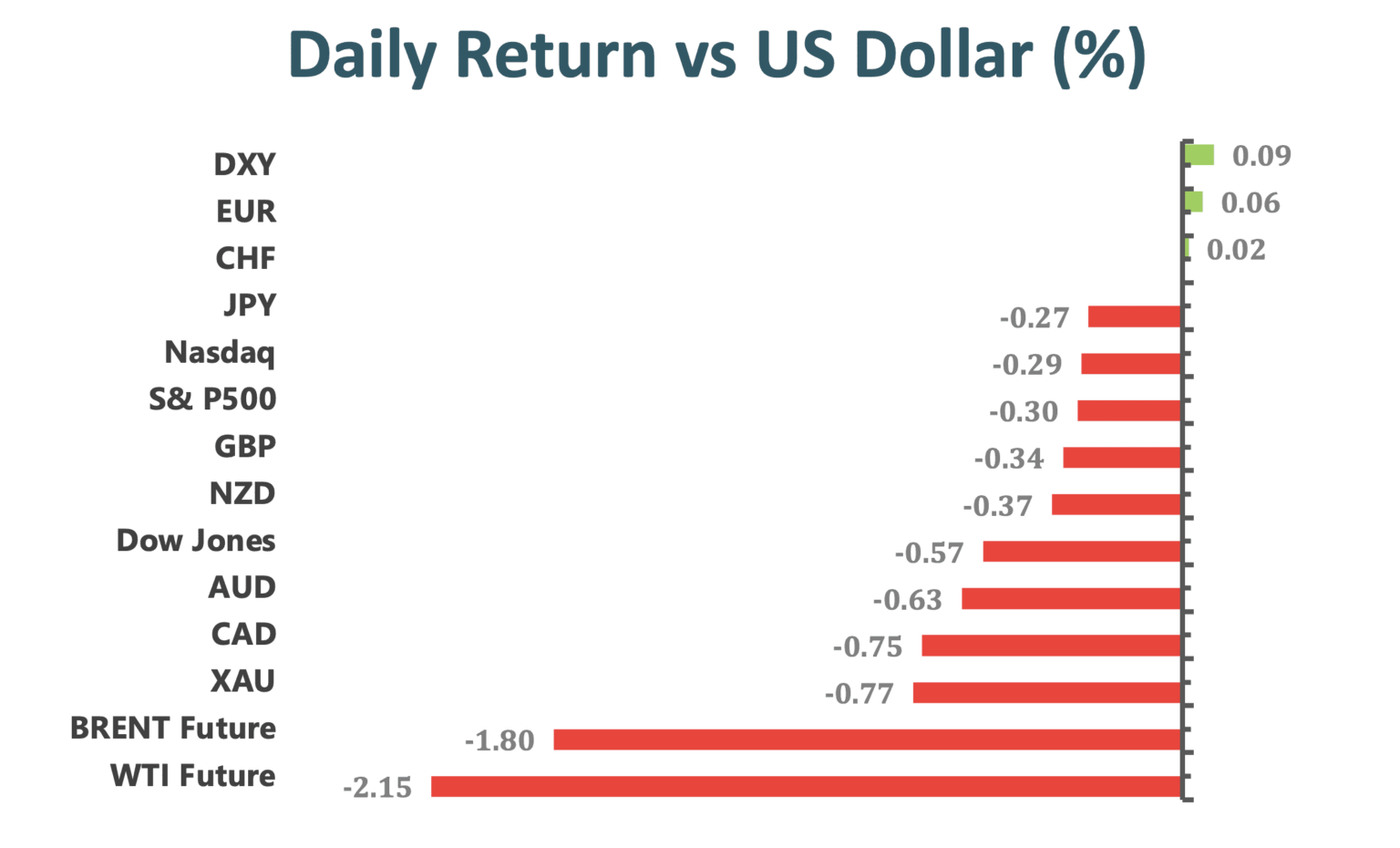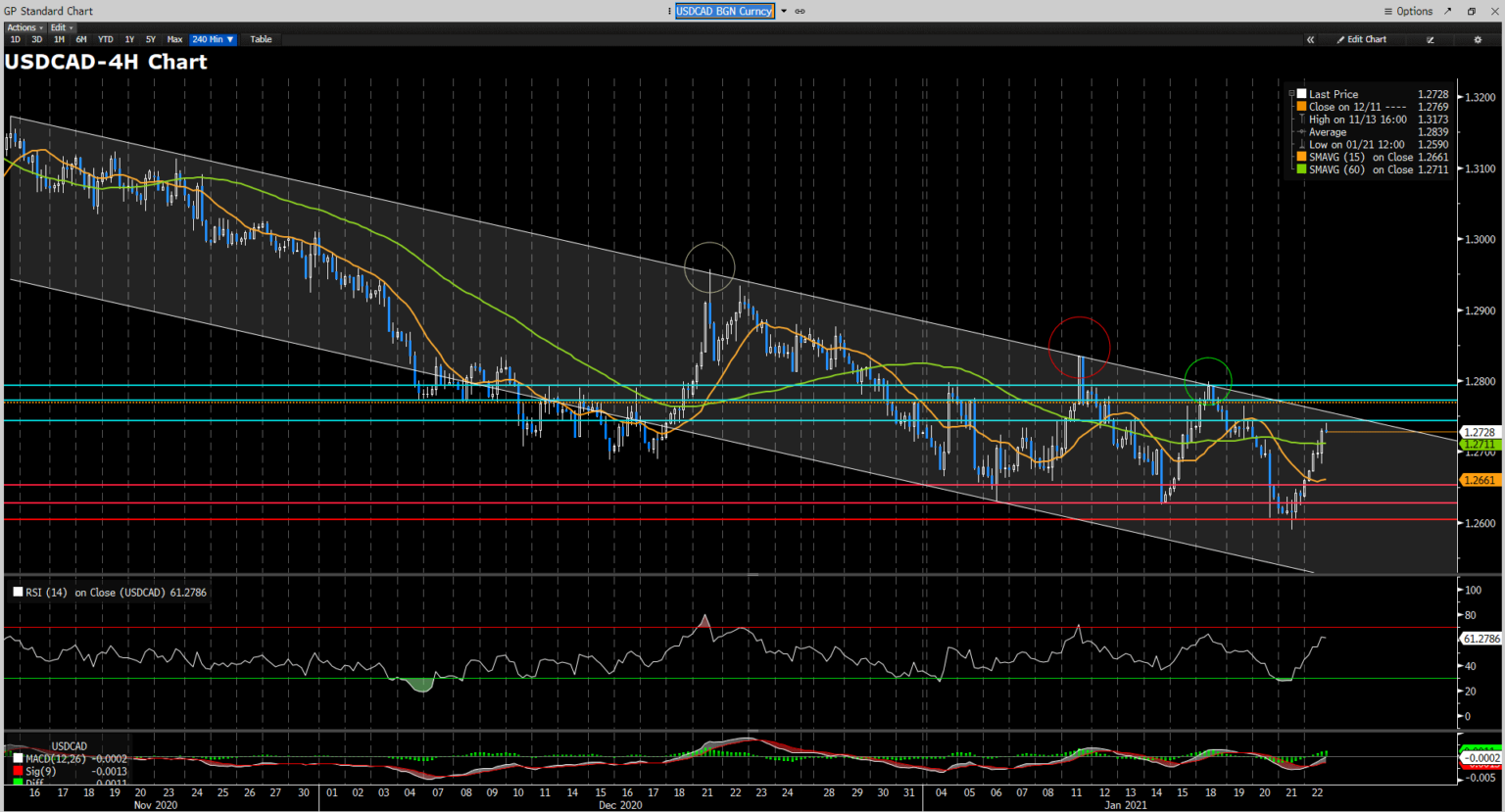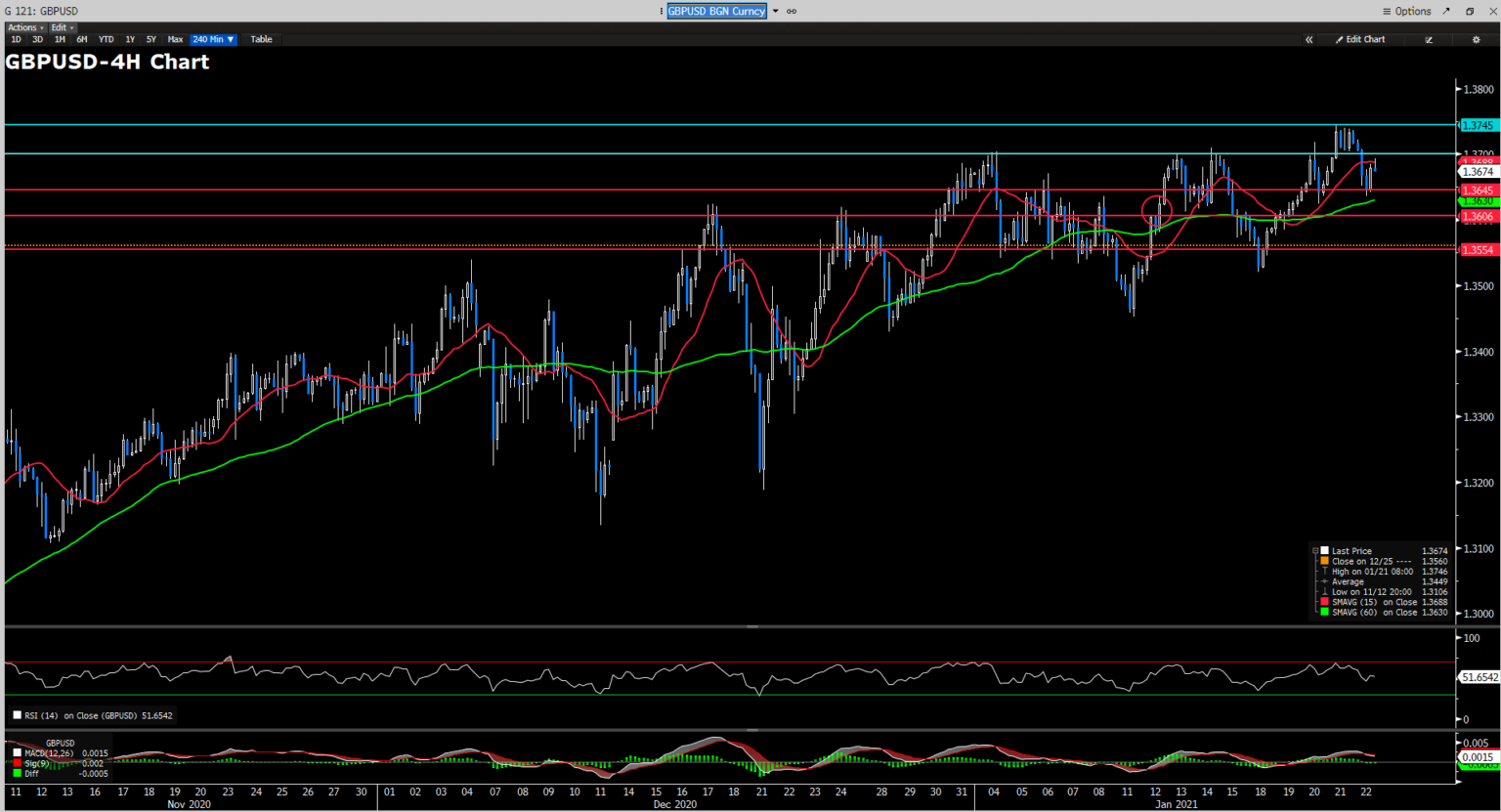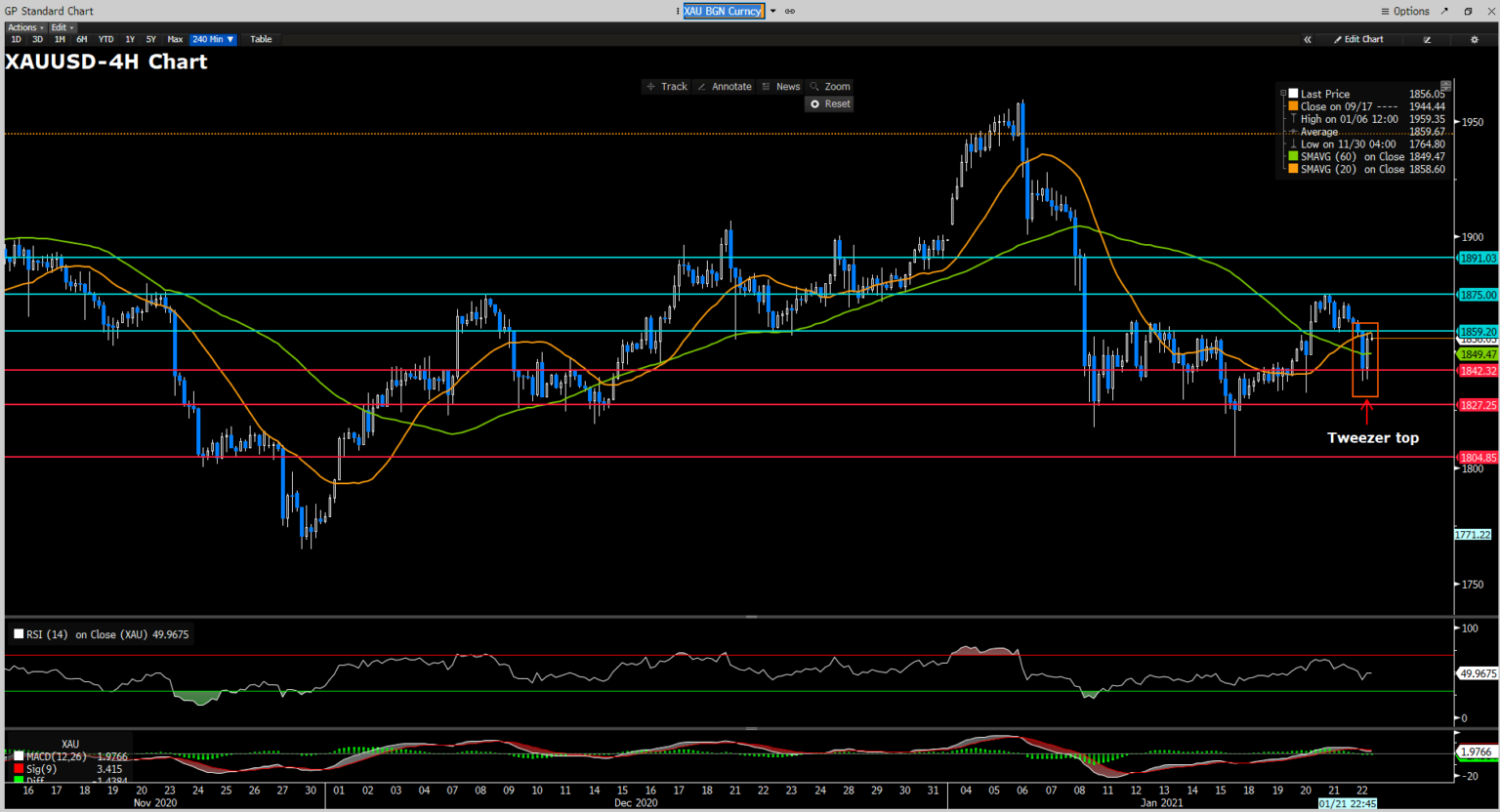January 25, 2021
Daily Market Analysis
Market Focus
US stocks slipped from records as investors grew anxious that the virus will hamper growth for longer than expected and Democrats may struggle to get a nearly $2 trillion spending bill through Congress. The S&P500 Index fell for the first time in four days, with losses widening on reports that the new virus strain may be deadlier. It rose 1.9% in the week. Oil’s slump dragged energy companies lower, while Intel Corp. dropped after its new boss recommitted to chipmaking, a move opposed by some investors. Yields on Treasuries edged lower, and crude oil slid below $53 a barrel.
Overseas markets struggled after economic data in Europe missed estimates. IHS Markit data showing a pickup in US manufacturing did little to boost sentiment. Senate Republicans continued to come out against Joe Biden’s aid package, threatening the legislation’s passage in the sharply divided body.
According to Scott Ladner, the chief investment officer at Horizon Investments, “The virus numbers are not good right now obviously around the world, especially in the US and in Europe, and we’re also getting a little bit more question about how much of the stimulus is actually feasible and what’s the timeline. Those two things are putting just a damper on the enthusiasm that has existed since November.”
The week’s global equity rally, spurred by expectations of economic support and the rollout of vaccines, paused as traders weigh still-troubling Covid-19 trends. Biden, who is pushing for $1.9 trillion in additional spending, unveiled a strategy to combat the virus while warning the pandemic will worsen before it improves. Restrictions intensified from Germany and the UK to Hong Kong, and the European Central Bank cautioned that the euro area is headed for a double-dip recession. The UK’s new more contagious strain of coronavirus may be linked to higher mortality, Prime Minister Boris Johnson has said.
Market Wrap

Main Pairs Movement
EURUSD has retreated from the highs near 1.22 as markets remain cautious ahead of President Biden’s speech on the economy. Earlier, EURUSD advanced in response to upbeat eurozone PMIs. The USDJPY pair is struggling to penetrate the 5-day Simple Moving Average hurdle for the second straight day. A break above the SMA hurdle would expose the upper end of the failing channel represented by trendlines connecting Jan. 11 and Jan. 19 highs and Jan. 13 and Jan. 21 lows. The AUDUSD pair continued to lose ground through the mid-European session and dropped to tow-day lows, around the 0.7700 round figure mark in the last hour.
The greenback finds it difficult to leave behind the recent weakness and now navigates without a clear direction in the vicinity of the 90.00 mark when tracked by the DXY. WTI crude oil prices are on the back foot on the final trading day of the week; prices dropped as low as the $51.50 mark in the early part of European trade, hitting their lowest levels in two weeks.
Technical Analysis:
USDCAD (4 Hour Chart)

The Loonie continues its 2-consecutive day win and is now trading above 1.27 level on the last day of the week. Despite the strong retail sales numbers for November and amid the soft crude oil prices and other risk assets and expectations that December retail sales will be much weaker, CAD remains an underperforming currency today. From a technical perspective, the Loonie bulls would definitely see some contention when attempting to top the 1.2745 resistance as that price level not only is a price zone that has acted as support and resistance levels multiple times previously, but also resembles a price zone that is on the upside of a long-term declining trend. Nevertheless, given that the RSI has yet to reach the 70 overbought threshold (currently fluctuates around the low 60s), there seems to be room for the bulls to further extend their rally. From the current levels, the most upcoming resistance at 1.2744 is likely to provide some fresh selloff pressure when reached. On the flip side, the 1.2653 level now seems to be the most immediate cushion for any sudden decline of the Loonie.
Resistance: 1.2746, 1.2770, 1.2794
Support: 1.2653, 1.2631, 1.2605
GBPUSD (4 Hour Chart)

The disappointing UK Retail Sales number and January’s preliminary PMIs both missed the forecasted estimation (forecasted UK Retail Sales: 0.8%, forecasted PMI: 50.7; actual UK Retail Sales: 0.4%, actual PMI: 40.6), which in turn, put the Cable on the back foot during the early European Session. Although the Cable has bottomed once again at weekly low near 1.3636 earlier, the pair still managed to climb back up near 1.3680 at the time of writing. Technically speaking, the 15-Day SMAVG is still supporting the bullish trend of GBPUSD. But, given that the GBPUSD has once again failed to find acceptance above the 1.3745 resistance level during the Asian session, it is reasonable to say that without a confirmative fundamental news or fresh demand to put the Cable above 1.3745, it would not be prudent to place additional long position at the current trading levels. The RSI is now indicating a neutral trading pattern.
Resistance: 1.3701, 1.3745
Support: 1.3645, 1.3606, 1.3554
XAUUSD (4 Hour Chart)

The price of XAUUSD dropped to $1837 but then climbed back up to around $1855 at the time of writing. The early retreat of the yellow metal is attributed to a modest pickup in the USD demand as President Joe Biden’s stimulus plan ran into some opposition from the Republicans. But with a tweezer top forming, we can expect that the gold traders have encountered a market-turning point. If the gold can penetrate the $1859 resistance level, the next upside target is around $1875, followed by $1891. Conversely, a decline in the XAUUSD pricing would first bring the pair down to $1842, then $1827. From a technical perspective, the 15-Day SMAVG is supporting a bullish XAUUSD, however, given that RSI is now hovering around 50, a roller-coaster type of day in XAUUSD trading seems like it would close the week without any apparent trading bias. In the upcoming week, XAUUSD traders would continue to monitor closely whether the new US administration would settle for quick wins of smaller stimulus package or try to pass a big bill.
Resistance: 1859, 1875, 1891
Support: 1842, 1827, 1804
Economic Data
Click here to view today’s important economic data.









